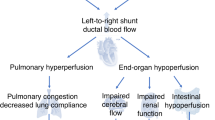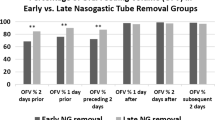Abstract
Objective:
We hypothesized that rectal stimulation and small volume enemas would accelerate normalization of stooling patterns in extremely low birth weight infants.
Study Design:
In a randomized controlled trial, infants with a gestational age ⩽28 weeks received one of the following: twice daily rectal stimulation and/or enemas until two stools were passed daily, without enemas or stimulation, for three consecutive days. Intervention only occurred when symptoms, abdominal distension and no defecation, occurred in the previous 24 h. Enema administration occurred if abdominal distension persisted without defecation occurring after rectal stimulation. Multivariable linear regression was used to determine the contribution of a patent ductus arteriosus (PDA) on normalization of stooling patterns and feeding tolerance.
Result:
Rectal stimulation and/or small volume enemas did not accelerate the median (quartile range) time normalization of stooling patterns, 13 (11–20) days in control group and 16 (12–25.5) days in intervention group. A higher frequency of PDA occurred in the intervention than the non-intervention group. Infants with a persistent PDA had a longer duration of parenteral nutrition, worse feeding tolerance and more days to achieve normal stooling patterns. In multivariable regression analysis, a PDA, not repeated rectal stimulation and/or enemas, was significantly related to stooling and feeding tolerance.
Conclusion:
Twice daily administration of rectal stimulation and/or enemas did not normalize stooling patterns (fecal frequency). A PDA is an important determinant of acquisition of normal stooling patterns and feeding tolerance of very immature newborns.
This is a preview of subscription content, access via your institution
Access options
Subscribe to this journal
Receive 12 print issues and online access
$259.00 per year
only $21.58 per issue
Buy this article
- Purchase on Springer Link
- Instant access to full article PDF
Prices may be subject to local taxes which are calculated during checkout

Similar content being viewed by others
References
Martin CR, Brown YF, Ehrenkranz RA, O’ Shea TM, Allred EN, Belfort MB et al. Extremely Low Gestational Age Newborns Study Investigators. Nutritional practices and growth velocity in the first month of life in extremely premature infants. Pediatrics 2009; 124: 649–657.
Bisset WM . Development of intestinal motility. Arch Dis Child 1991; 66 (1 Spec No): 3–5.
Mihatsch WA, Franz AR, Lindner W, Pohlandt F . Meconium passage in extremely low birthweight infants and its relation to very early enteral nutrition. Acta Paediatrica 2001; 90 (4): 409–411.
Haiden N, Jilma B, Gerhold B, Klebermass K, Prusa AR, Kuhle S et al. Small volume enemas do not accelerate meconium evacuation in very low birth weight infants. J Pediatr Gastroenterol Nutr 2007; 44: 270–273.
Sáenz de Pipaón Marcos M, Teresa Montes Bueno M, SanJosé B, Torralba E, Gil M, Parada I et al. Acquisition of full enteral feeds may depend on stooling pattern in very premature infants. J Perinat Med 2012; 40: 427–431.
Walsh MC, Kliegman RM . Necrotizing enterocolitis: treatment based on staging criterioa. Pediatr Clin North Am 1986; 33: 179–201.
Clyman RI . Ibuprofen and patent ductus arteriosus. N Engl J Med 2000; 343: 728–730.
Bell EF, Acarregui MJ . Restricted versus liberal water intake for preventing morbidity and mortality in preterm infants. Cochrane Database Syst Rev 2008; 23 (1): CD000503.
Patote SK, Kumaran V, Travadi JN, Brooks JM, Doherty DA . Does patent ductus arteriosus affect feed tolerante in preterm neonatos? Arch Dis Child Fetal Neonatal Ed 2007; 92: F53–F55.
Khadr S, Ibhanesebhor SE, Rennix C, Fisher HE, Manjunatha CM, Young D et al. Randomised Controlled Trial: impact of glycerin suppositories on time to full feeds in preterm infants. Neonatology 2011; 100: 169–176.
Acknowledgements
We thank Dr Steven Abrams, University of Baylor, for critically reading the manuscript. M Sáenz de Pipaón Marcos was supported by grant FIS 12/00086 and by a grant from the National Spanish Neonatal Society.
Author information
Authors and Affiliations
Corresponding author
Ethics declarations
Competing interests
The authors declare no conflict of interest.
Rights and permissions
About this article
Cite this article
Sáenz de Pipaón Marcos, M., Teresa Montes Bueno, M., SanJosé, B. et al. Randomized controlled trial of prophylactic rectal stimulation and enemas on stooling patterns in extremely low birth weight infants. J Perinatol 33, 858–860 (2013). https://doi.org/10.1038/jp.2013.86
Received:
Accepted:
Published:
Issue Date:
DOI: https://doi.org/10.1038/jp.2013.86
Keywords
This article is cited by
-
Lipid enemas for meconium evacuation in preterm infants – a retrospective cohort study
BMC Pediatrics (2021)
-
Darmentleerung sehr unreifer Frühgeborener
Monatsschrift Kinderheilkunde (2019)



